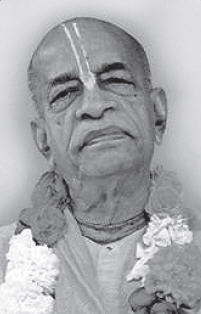
Vrindavana, October 23, 1972
Three levels of consciousness
Pradyumna (reading): Generally, neophyte devotees are anxious to see Krishna, or God, but God cannot be seen or known by our present materially blunt senses. The process of devotional service as it is recommended in The Nectar of Devotion will gradually elevate one from the material condition of life to the spiritual status wherein the devotee becomes purified of all designations. The senses can then become uncontaminated, being constantly in touch with bhakti-rasa. When the purified senses are employed in the service of the Lord, one becomes situated in bhakti-rasa life, and any action performed for the satisfaction of Krishna in this transcendental bhakti-rasa stage of life can be relished perpetually. When one is thus engaged in devotional service all varieties of rasas or mellows turn into eternity. In the beginning one is trained according to the principles of regulation under the guidance of the acharya or spiritual master, and gradually, when one is elevated, devotional service becomes automatic and spontaneous eagerness to serve Krishna. There are twelve kinds of rasa, as will be explained in this book, and by renovating our relationship with Krishna in five primary rasas we can live eternally in full knowledge and bliss.
Prabhupada: There are three kinds of devotional stages: Kanistha adhikara, lower stage, the madhyama adhikara, middle stage, and uttama adhikara. So the Kanistha-adhikara means:
arcayam eva haraye
pujam yah sraddhayehate
na tad-bhaktesu canyesu
sa bhaktah prakrtah smrtah
A devotee who faithfully engages in the worship of the Deity in the temple but does not behave properly toward other devotees or people in general is called a prakrta-bhakta, a materialistic devotee, and is considered to be in the lowest position. (Bhag. 11.2.47)
In the lower stage, the devotee is engaged in Deity worship. It is not that Deity worship is lower than meditation. Deity worship is the beginning of devotional service. How to approach the Deity, how to cleanse the floor, how to change the dress, flower, how to make arati everything is mentioned in detail in the Bhakti-rasamrita-sindhu.
One who is not advanced, he cannot see Krishna properly. When we speak of Krishna, He is not alone. Just like if we speak of king, “The king is coming,” it does not mean the king is coming alone. His ministers, his secretaries, his military commanders, his queens, his servants, so many other servitors of the king, they are also coming. Krishna says in the Bhagavad-gita, aham sarvasya prabhavah [Bg. 10.8]. Krishna is the root of all emanations: Krishna’s expansion, Krishna’s different types of energies, parasya saktir vividhaiva sruyate [Cc. Madhya 13.65, purport]. He has got multi-energies, out of which the acharyas have taken three principal energies, the external energy, the internal energy, the marginal energy. And Krishna’s incarnations and expansions all together mean Krishna.
THE KANISTHA ADHIKARI
The Kanistha-adhikari in the lower stage thinks that he’s worshiping the Deity very nicely so he has realized Krishna. No. Na tad-bhaktesu canyesu sa bhaktah prakrtah smrtah. We have to make further advancement. Krishna does not mean alone. Krishna’s devotees are especially always with Krishna. Therefore when we recognize a devotee of Krishna and offer him respect as devotee of Krishna that is further advancement.
In the madhyam-adhikari stage, or in further advancement of devotional service, one can see four categories.
isvare tad-adhinesu
balisesu dvisatsu ca
prema-maitri-krpopeksa
yah karoti sa madhyamah
“The intermediate Vaishnava has to love God, make friends with the devotees, instruct the innocent and reject jealous people. These are the four functions of the Vaishnava in the intermediate stage.” [Cc. Madhya 22.64]
ADVANCE DEVOTEE

When we are further advanced, we not only see Krishna, but also His devotees. We can recognize, “Here is a pure devotee of Krishna.” In the lower stage a devotee is concerned with Deity worship; he does not take much care of the devotees. But when one is advanced further, he can see Krishna and His devotees also. Isvara tad-adhina. Tad-adhina means devotees. Devotees are always under the service of Krishna. So anyone who is giving service to Krishna, we should take care of them also. We should offer our respect. It is stated in Bhakti-rasamrita-sindhu that if a devotee is coming, and there is no one to receive him, then a pujari engaged in Deity worship may stop Deity worship for the time being and should go immediately to receive the devotee. Krishna also says mad-bhakta-puja abhyadhika. Krishna is satisfied more when a devotee worships His devotee. Krishna says, “If one is worshiping Me and one is worshiping My devotee, then the person who is worshiping the devotee, he’s more important than the person who is worshiping Krishna.”
Therefore in the Gurvastaka by Visvanatha Cakravarti Thakura, it is said there: Yasya prasadad bhagavad-prasado yasya aprasadad na gatih kuto ‘pi: “By the mercy of the spiritual master one receives the benediction of Krishna. Without the grace of the spiritual master, one cannot make any advancement.”
The best devotee is the spiritual master. Unless one is devotee, pure devotee, how he can be spiritual master? Spiritual master means representative of God. So who can become representative of God? Unless he is twenty-four hours engaged in the service of God, Krishna, how he can be spiritual master? This is also explained by Visvanatha Cakravarti Thakura saksad-dharitvena samasta-sastraih. The spiritual master is described as as good as Hari, the Supreme Personality of Godhead, because the spiritual master is representative of Krishna, the most confidential servant of Krishna.
But the spiritual master does not think of himself as Hari. Although he’s offered the respect of Hari, he thinks himself as humble servant of Hari and all others. A spiritual master takes disciples as his spiritual master. He thinks, “Krishna has sent me so many spiritual masters.” He does not think himself as spiritual master. He thinks himself their servant, because Krishna has appointed him to train them. Therefore he thinks himself as servant of the disciples. This is the position. So when one is advanced, he can see the importance of devotees.
The advanced devotee never disobeys or disrespects another devotee. Disrespect to another devotee is a great offense, vaishnava-aparadha. Vaishnava-aparadha is a very serious offense. Therefore we teach to address amongst the devotees “Prabhu,” “Such and such Prabhu.” This should not be simply spoken by the lips. It should be realized. Everyone should think other devotee as his prabhu, master. He should try not to become master.
trnad api sunicena
taror api sahisnuna
amanina manadena
kirtaniyah sada harih
“One can chant the holy name of the Lord in a humble state of mind, thinking himself lower than the straw in the street. One should be more tolerant than the tree, devoid of all sense of false prestige and ready to offer all respects to others. In such a state of mind one can chant the holy name of the Lord constantly.” (Siksashtaka 3)
We should be always ready to offer respect to all, not only devotees, but everyone, because every living entity is originally a devotee of Krishna. But circumstantially, being covered by the coat of maya, he’s playing like demon. But his original nature is a devotee of Krishna.
Bhakti, devotional service begins when one is actually self-realized. Before that, sa bhaktah prakrtah smrtah. Anyone who has got the identification of this body, he is engaged in Deity worship, but he does not actually realize his self, he does not know who is a devotee, and he does not know his duty to other persons, he remains a prakrta-bhakta. Prakrta-bhakta means he’s situated on the material platform, but under the direction of spiritual master, under the direction of the sastras, he’s trying to improve his condition of material existence. That is called prakrta-bhakta. We should not remain perpetually a prakrta-bhakta. We must improve to the level of madhyama-bhakta. Madhyama-bhakta means he knows what is God, and what is Krishna’s devotee. He knows the people in general, and he knows the atheistic persons. Four categories of persons manifest before him. We may artificially say, “In my view, everyone is the same…” That is, of course, higher stage. Panditah sama-darsinah [Bg. 5.18]. But we should not imitate that stage. Because we are in the neophyte stage, we should not imitate the vision of maha-bhagavata. Maha-bhagavata does not see anyone as non-devotee. He sees everyone as a better devotee than himself. Just like Krishnadasa Kaviraja Goswami. He writes in the Caitanya-caritamrta:
jagai madhai haite muni se papistha
purisera kita muni se lagistha
“I am a worse sinner than Jagai and Madhai and am even lower than the worms in the stool.”
He’s not pretending. Actually, a maha-bhagavata, thinks, “I am the lowest.”
trnad api sunicena
taror api sahisnuna
amanina manadena…
He wants to give respect to everyone, but he doesn’t expect any respect for himself. If one wants respect for oneself, that means he’s still Kanistha-adhikari. A maha-bhagavata is ready to give respect even to the ant. And for himself he doesn’t want any respect. That is maha-bhagavata. A devotee should not only give respect to the devotees, but he should try to make others into devotee. That means preaching.
What is the meaning of preaching? People are engaged in material activities, and the preacher should approach them and say, “You are spoiling your time, my dear sir. You become a devotee of Krishna.” This is preaching. “You are simply spoiling. You have got this human form of life, but you are utilizing it like animals eating, sleeping, mating, and defending. You may be very great political leader, but your engagement is like animal.” That is the fact.
What these politicians do? They make arrangement for eating, sleeping, mating, and defending. That’s all. They promise, “I shall give you nice eating. You give me vote. Make me minister of food. I shall give you enough food.” Or so many other things, they falsely promise, or rightly promise. Actually, minister or minister’s father no one can give you food. The food is supplied by Krishna. Eko bahunam yo vidadhati kaman: the Lord is supplying everyone’s necessities.
MADHAYAM ADHIKARI
isvare tad-adhinesu
balisesu dvisatsu ca
prema-maitri-krpopeksa
yah karoti sa madhyamah

The Kanistha-adhikari is just learning how to become devotee and he is, by regulative principles, engaged in Deity worship, and gradually he’s raised to the platform of madhyam-adhikari. Madhyam-adhikari means he knows what is the position of God, Krishna what is the position of devotee, what is the position of people in general, and what is the position of an atheist. isvare tad-adhina, or the devotees; balisa means innocent persons. And dvisatsu means envious. There are many persons, who as soon as they hear something about God become immediately irritated. That is called dvisatsu, demon. So a madhyam-adhikari devotee can see these four kinds of persons: the Supreme Personality of Godhead Krishna; His devotees; innocent persons; and the atheist class, demons. So he treats all these four classes accordingly.
He tries to love God. He tries to make friendship with the devotees and not become envious of them. If the devotee is uttama-adhikari, he should take lessons from him. If he’s equal, then he should make friends with him. And if he’s lower, then he should try to help him to become a higher devotee.
With Isvara, God, he simply tries to increase love for Krishna, Yato bhaktir adhoksaje. How I can render better service to Krishna? This is one business. Another business is to make friendship with anyone who is devotee. To those who are innocent just like a child, simple, who are not offenders, devotee tries to preach Krishna consciousness. Those who are dvisatsu, demons, simply against God, devotees avoid them. Don’t go to them for preaching. Neither to love them. Of course, everyone should be loved, but according to the time and circumstances. So for a preacher who is trying to do good to the innocent persons who do not know what is God, how to love God a preacher’s business is to teach them. And not to waste his time with the demons who are not interested in the matter of God.
MAHA BHAGAVATA
When you are raised to the highest platform of devotional service, then there is no more dvisatsu. No more friends, no more enemies. A maha-bhagavata sees that “Everyone is engaged in the service of the Lord, except me.” That is maha-bhagavata’s vision. But we should not imitate that. A maha-bhagavata feels like that, that “I am the lowest.” Just like Bhaktivinoda Thakura has sung, amara jivana, sada pape rata, nahiko punyera lesa. He says, “My life is always engaged in sinful activities. I’ve not a trace of pious activity. I have given so much distress to all other living entities.” He’s representing common man. But he’s feeling like that. It is not that he is artificially speaking. Just like Radharani. She thinks always Herself as the lowest of the devotees. She feels that the other gopis are better qualified to serve Krishna. And She is not so much qualified. Therefore in Vrindavana, you’ll find, the devotees approach Radharani. “Jaya Radhe.” Because if Radharani advocates for him to Krishna, he will be very easily accepted. If Radharani’s pleased, then She represents the devotee’s case that “Here is a devotee. He’s better than Me. Kindly accept his service Krishna.” So Krishna cannot deny.
The best example is Caitanya Mahaprabhu. He’s Krishna Himself, but He’s playing the part of maha-bhagavata. He never discussed Krishna’s rasa-lila publicly. He simply dealt with ordinary persons by chanting Hare Krishna mantra and whenever there were scholars and philosophers like Sarvabhauma Bhattacharya, Prakasananda Sarasvati, He talked philosophy, Vedanta-sutra. And when there was high-class devotee like Ramananda Raya, He discussed about Krishna’s lila. Not that with everyone He discussed Krishna’s lila. No. Neither did He discuss philosophy with everyone. For the general public, so long He remained at Jagannatha Puri, every evening, He was simply organizing great sankirtana party, four hours, at least. Although He’s Krishna Himself, He’s playing the part of acharya, playing the part of devotee.
So we should follow Caitanya Mahaprabhu, the six Goswamis, and gradually, let us learn what devotional service is, and how to execute it. Everything is very nicely explained in the Bhakti-rasamrita-sindhu which we have presented herewith as The Nectar of Devotion, the complete science of bhakti-yoga. So first of all, we should take advantage of these granthas, and then gradually make progress. Narottama Dasa Thakura therefore says:
rupa-raghunatha-pade haibe akuti
kabe hama bujhabo sri yugala-piri…
Our aim is to become devotee of Radha-Krishna, but to know how to become devotees of Radha-Krishna, we must study these books, Bhakti-rasamrita-sindhu especially.
Thank you very much. (end)
